TRADERS ROAD TRANSPORT ASSOCIATION CONFERENCE, SCARBOROUGH
Page 84
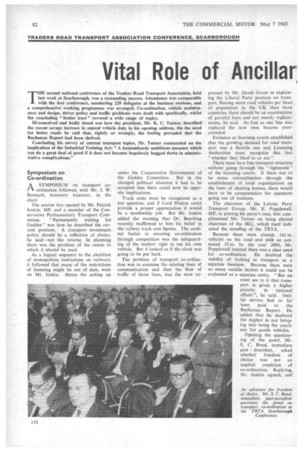
Page 85
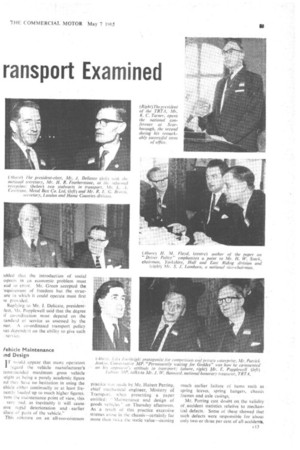
Page 86
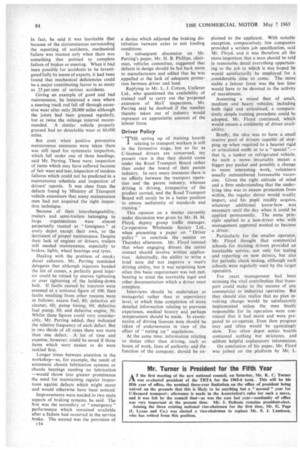
Page 87
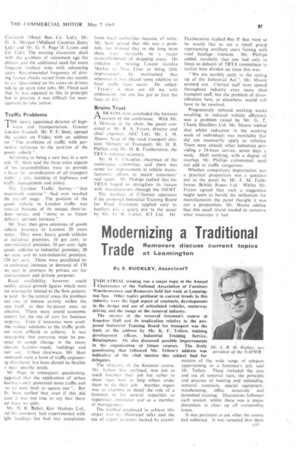
Page 88
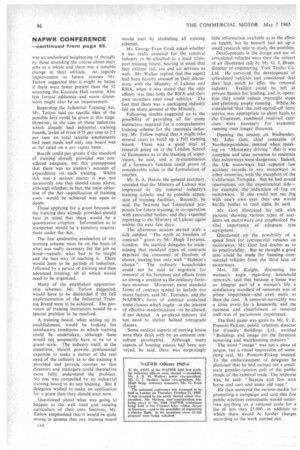
If you've noticed an error in this article please click here to report it so we can fix it.
Vital Role of AnciIlar ransport Examined
THE second national conference of the Traders Road Transport Association, held last week at Scarborough, was a resounding success. Attendance was comparable with the first conference, numbering 220 delegates at the business sessions, and a comprehensive working programme was arranged. Co-ordination, vehicle maintenance and design, driver policy and traffic problems were dealt with specifically, whilst the concluding "brains trust" covered a wide range of topics.
III-conceived and badly timed was how the president, Mr. K. C. Turner, described the recent savage increase in annual vehicle duty in his opening address. On the need for better roads he said that, rightly or wrongly, the feeling pervaded that the Buchanan Report had been shelved.
Concluding his survey of current transport topics, Mr. Turner commented on the implication or the Industrial Training Act: "A tremendously ambitious measure which can do a great deal of good if it does not become hopelessly bogged down in administrative complications."
Symposium on Co-ordination
ASYMPOSIUM on transport coordination followed, with Mr. J. W. Ban nard, honorary treasurer, in the chair.
The session was opened by Mr. Patrick Jenkin, MP, and a member of the Conservative Parliamentary Transport Committee. "Permanently waiting for Geddes" was how he described the current position. A transport investment policy should be a reflection of choice, he said—not the reverse. In planning there was the problem of the extent to which it should be used.
As a logical sequence to the abolition of monopolistic restrictions on railways, it followed that many of the restrictions of licensing might be out of date, went on Mr. Jenkin. Hence the setting up
under the Conservative Government of the Geddes Committee. But in the changed political situation it had to be accepted that there could now be opposite implications.
Track costs must be recognized as a key question, and if Lord Hinton could provide a proper appreciation it would be a -worthwhile job. But Mr. Jenkin added the warning that Dr. Beeching recently reaffirmed to him his belief in the railway track cost figures. The cardinal factor in ensuring co-ordination through competition was the safeguarding of the traders' right to use his own vehicle. But it looked as if the clock was going to be put back.
The problem of transport co-ordination was to examine the existing lines of communication and then the flow of traffic of those lines, was the view ex
pressed by Mr. David Green in explaining the Liberal Party position on transport. Having more road vehicles per head of population in the UK than most countries, there should be an examination of parallel lines and not merely replacements, he said. As fast as one line was replaced the new ones became overcrowded.
Evidence at licensing courts established that the growing demand for road transport was a flexible one and Licensing Authorities must recognize this fact " whether they liked to or not ".
There must be a free transport structure without going through the "rigmarole" of the licensing courts. If there was to be some rationalization through the establishment of local organizations on the basis of clearing houses, there would have to be compensation for operators going out of business.
The chairman of the Labour Party Transport Group, Mr. E. Popplewell, MP, in putting his party's case, first complimented Mr. Turner on being elected chairman of the 1RU, which itself indicated the standing of the TRTA.
Because there were already 141 m. vehicles on the road and with an estimated 33 m. by the year 2000, Mr. Popplewell insisted there was a clear need for co-ordination. He doubted the validity of looking at transport as a separate business. Because there were so many outside factors it could not be evaluated as a separate entity. "But we must see to it that transport is given a higher priority in national affairs ", he said. Only lip service had so far been paid to the Buchanan Report. He added that he deplored the neglect in not bringing into being the yearly test for goods vehicles.
Opening the questioning of the panel, Mr. S. C. Bond, immediate past president, asked whether freedom of choice was not an implicit condition of co-ordination. Replying, Mr. Jenkin agreed, and
Idded that the introduction of social ispeets in an economic problem must. cad 1 o error. Mr. Green accepted the -equirement of freedom but the .struc:ure in which it could operate must first 3e pro‘ided.
Repl■ing to Mr. J. Delicate, president:feet, \in Popplewell said that the degree if co-ordination must depend on the tandard of service as assessed by the user. A co-ordinated transport policy vas dependent on the ability to give suth secs
lehicie Maintenance Ind Design
ITwould appear that many operators regard the vehicle mariufacturer's tcommended maximum gross -vehicle /eight as being a purely academic figure nd the. htt■,.e no hesitation in using the chicle either continually or at least freuentl■ loaded up to much higher figures. 'rom the maintenance point of view, this ver■ -flitd. as inevitably it will cause tore rapid deterioration •and earlier dime of parts of the vehicle."
This stricture on an all-too-common practice inode by Mr. Hubert Perring, chief mechanical engineer. Ministry of Transport. when presenting a paper
entitled: Maintenance and design of goods vehicles " on Thursday afternoon. As -a result of this practice. excessive. stresses arose in he chassis—certainly far more than twice the static value—causing
much earlier failure of items such as spring leaves, spring hangers, chassis frames and axle casings,
Mr. Pet-ring cast doubt on the validity of,accident statistics relative to mechanical defects. Some of these showed that such defects were responsible for about only two or three per cent of all accidents, 113
In fact, he said it was inevitable that because of the circumstances surrounding the reporting of accidents, mechanical failure was blamed only when there was something that pointed to complete failure of brakes or steering. When it had been possible for accidents to be investigatediully by teams of experts, it had been found that mechanical deficiencies could be a major contributing factor in as many as 25 per cent of serious accidents.
Giving an example of good and bad maintenance, he instanced a case where a steering track rod fell off through excessive wear after only 20,000 miles although the joints had been greased regularly, but at twice the mileage interval recommended. A similar vehicle properly greased had no detectable wear at 60,000 miles.
But even when positive preventive maintenance measures were taken there was stilt need for systematic inspection, which fell under one of three headings, said Mr. Perring. These were: inspection of items which may have suffered because of fair wear and tear, inspection of random failures which could not be predicted in a maintenance schedule and inspection of drivers' reports. It was clear from the defects found by Ministry of Transport vehicle examiners that many maintenance men had not acquired the right inspection technique.
Because of their interchangeability, trailers and semi-trailers belonging to large organizations were almost perpetually treated as " foreigners " at every depot except their own, to the detriment of proper maintenance. Despite their lack of engines or drivers, trailers still needed maintenance, especially to brakes, lights, wheel bearings and tyres.
Dealing with the problem of smoky diesel exhausts, Mr. Perring reminded delegates that although injectors headed the list of causes, a perfectly good injector could be ruined by uneven tightening or over tightening of the holding-down bolt. If faults caused by injectors were assessed at a notional figure of 100, then faults resulting from other reasons were as follows: excess fuel, 80; defective air cleaner, 60; pump timing, 60; defective fuel pump, 60; and defective engine, 50. Whilst these figures could vary considerably, Mr. Perring added, they indicated the relative frequency of each defect. But in two thirds of all cases there was more than one defect. A lot of time and expense, however, could be saved if those items which were easiest to do were tackled first.
Longer times between attention in the workshop—as, for example, the result of automatic chassis lubrication systems or chassis bearings needing no lubrication —would throw into greater prominence the need for maintaining regular inspections against defects which might occur and would otherwise have been noticed.
Improvements were needed in two main aspects of braking systems, he said. The first was the secondary or " emergency " performance which remained available after a failure had occurred in the service brake. The second was the provision of FM a device which adjusted the braking distribution between axles to suit loading conditions.
In subsequent discussion on Mr. Perring's paper, Mr. H. B. Phillips, chairman, vehicles committee, suggested that defects in design should be fed back more to manufacturers and added that he was appalled at the lack of adequate protection between. driver and load.
Replying to Mr. L..). Cotton. Unilever Ltd., who questioned the availability of trained staff to carry out the' proposed extension of IVIoT inspections, Mr. Perring said he doubted if the number thereby taken out of industry would represent an appreciable amount of the labour force.
Driver Policy
"T'HE setting up of training boards
1 relating to transport workers is still in the formative stage, but so far as C-licensed drivers are concerned, my present view is that they should come under the Road Transport Board rather than under the board of their parent industry. In very many instances there is no affinity between the transport operation and the parent industry, whereas driving is driving, irrespective of the product carried, and the Road Transport Board will surely be in a better position to ensure uniformity of standards and training."
This opinion on a matter currently under discussion was given by Mr. H. M. Floyd, deputy group traffic manager, Co-operative Wholesale Society Ltd., when presenting a paper on "Driver policy" to conclude the session on Thursday afternoon. Mr. Floyd insisted that when engaging drivers the initial contact should involve written application. Admittedly, the ability to write a brief note did not improve a man's driving ability, but it was surprising how often this basic requirement was not met, bearing in mind the inevitable legal and other documentation which a driver must complete.
Interviews should be undertaken at managerial rather than at supervisory level, at which time completion of. more detailed information relating to previous experience, medical history and perhaps temperament should be made. In examination of driving licences note should be taken of endorsements in view of the effect of "totting up" regulations.
At the same time, information relating to duties other than driving, such as hours of work, lines of authority and the function of the company, should be ex
plained to the applicant. With notable exception, comparatively few companies provided a written job specification, said Mr. Floyd, and it was therefore all the more important that a man should be told in reasonable detail everything appertaining to the job in which it was hoped he would satisfactorily be employed for a considerable time to come. The more stable a labour force was the less time would have to be devoted to the activity of recruitment.
Assuming a mixed fleet of small, medium and heavy vehicles; including both rigid and articulated, a comparatively simple training procedure could be adopted, Mr. Floyd continued, which would ensure a continuity of driver availability.
Briefly, the idea was to have a small reserve pool of drivers capable of stepping up when required to a heavier rigid or articulated outfit or to a "special that is, a tanker or refrigerated vehicle. As such a move invariably meant a bigger pay packet and possibly a change to more interesting work, volunteers usually outnumbered foreseeable vacancies. Given the right attitude of mind and a firm understanding that the underlying idea was to ensure promotion from within, the regular driver would readily impart, and his pupil readily acquire, whatever additional know-how was necessary until the day when it could be applied permanently. The same principle applied to a non-driver who with management approval wanted to become a driver.
Particularly for the smaller operator, Mr. Floyd thought that commercial schools for training drivers provided an invaluable service, not only for testing and reporting on new drivers, but also for periodic check testing, although such schools were regularly used by the larger operators.
For years management had been stressing the vital contribution that transport could make to the success of any commercial or industrial operation. But they should also realize that no plan involving change would be satisfactorily implemented unless the men finally responsible for its operation were convinced that it had merit and were prepared to co-operate. Even then progress may and often would be agonizingly slow. Too often depot notice boards contained nothing but strictures, and seldom helpful explanatory information.
On conclusion of his paper, Mr. Floyd was joined on the platform by Mr. L. Castleton (Metal Box. Co. Ltd.), Mr. G. A. Morgan (Midland Counties Dairy LW.) and Mr. G. F. Page (1. Lyons and Co. Ltd.). The ensuing discussion _dealt with the problem of retirement age for drivers and the additional need for more frequent medical tests with advancing years. Recommended frequency of driving-licence checks varied from one month to six. Questioned on his views on drivers taking up spare time jobs, Mr. Floyd said that he was opposed to this in principle but in practice it was difficult for management to take action.
Traffic Problems
THE newly appointed director of high wass and transportation, Greater London Council. Me. P. F. Stott, opened the session on Friday with art address on " The problems of traffic. with particular reference to the position of the goods vehicle".
Admitting to being a new boy in a new job. \I;. Stott said the three main aspects of his responsibilities were to provide a focus for co-ordination of all transport within a city, building of highways and traffic management and policy.
The London Traffic Survey—" that mainmoth exercise "—had now reached the pay-off stage. The position of the goods vehicle in London traffic was assured because of its unique door-todoor service and " more so as future delivery servicea increase".
Mr. Stott then gave estimates of goods vehicle journeys in London 20 years hence. They were: heavy goods vehicles to industrial premises, 10 per cent; to ion-industrial premises, 50 per cent; light goods vehicles to industrial premises, 20 per cent, and to non-industrial premises, 120 per cent. These were paralleled by to estimated increase in demand of 170 Jer cent in journeys by private car for :ntertainment and private purposes.
Road availability, however, could nodifv actual growth figures which were lot necessarily related to the flow pattern, le said. In the central areas the problem vas one of intense activity within the trea itself, so that by-passes were no elution. There were sound economic easons for the use of cars for business imposes. Even if resources were avail;ble radical solutions to the traffic probem were difficult to achieve. It was nescapablc that everyone must be pretared to accept change to the many elevant factors—roads, buildings and heir use. Urban clearways, Me Stott ontinueci, were a form of traffic engineerag shorthand, but bans should be flexible a meet specific needs.
Mr. Page. in subsequent questioning, uggested that the application of urban learways only generated more traffic and so we were back to square one". But Ir. Stott replied that even if this did ccur it was not true to say that there ad been no gain, Mr. D. R. Baker, Key Markets Ltd., tid his company had experimented with ight loadings but had met complaints from local authorities because of noise. Mr. Stott agreed that this was a problem, btu insisted that in the long term
there Al 11,1 I rICVitably he a major re-establishment of shopping areas. On criticism or moving Covent Garden Market to Nine Elms as beinglittle
improN einem. he maintained that wherever it was placed some addition to local traffic must occur. He added: " Frank Is it does not fill me with enthusiasm, hut one has got to face the facts of life," Brains Trust
A BRAINS !rust concluded the business risession of the conference. With Mr. J. Delicate in the chair, the panel consisted of Mr. R. A. Fryars, director and
chief engineer. AEC Ltd.; Mr. M. Moore. head of the road transport division. alinistry of Transport; Mr. H. B. Phillips and Mr. H. R. Featherstone, the TRTA national secretary,
Mr. H. C. Chandler, chairman of the conference committee, said there was scope for improvement in vehicle manufacturers' efforts to match customers' real needs. Mr. Phillips replied that the TRTA hoped to strengthen its liaison with manufacturers -through the SMMT.
The position of C-licence operators if the proposed Industrial Training Board for Reed Transport applied only to hauliers was a query put -to the panel by Mr. G. R. Carter, ICI Ltd. Mr.
Featherstone replied that if that were so he would like to see a small group representing ancillary users liaising with road haulage interests. Mr. Phillips added, jocularly, that one had only to listen 40 debates of TRTA committees to realize how divided an issue this was.
"We are terribly early in the setting up of the Industrial Act ", Mr. Moore pointed out. Clerical staff were spread throughout industry even more than transport staff, but the problem of diversification here, as elsewhere, would still have to be resolved.
Progressively reduced working weeks resulting in reduced vehicle efficiency was a problem raised by Mr. G. if. Chard, Distillers Ltd. Mr. Moore replied that whilst reduction in the working week of individuals was inevitable that did not necessarily apply to vehicles. There were already other industries providing a 24-hour service, seven days a week. Shift working, with a degree of overlap, Mr. Phillips commented, need not add to traffic congestion.
Whether compulsory depreciation was a practical proposition was a question put to the panel by Mr. F. M. Fieldhouse, British Ropes Ltd. Whilst Mr. Fryars agreed that such a suggestion might seem to herald the millenium for manufacturers the panel thought it was not a proposition, Mr. Moore adding that this small island needed to conserve what resources it had.
was an undoubted heightening ,)f thought by those attending the course about their jobs as a whole and there was a notable change in their attitude. As regards improvement in future courses Mr. Tetlow suggested that it might be better if there were fewer present than the 32 attending the Knuston Hall course. Also less formal addresses and more discussions might also be an improvement.
Regarding the Industrial Training Act, Mr. Tetlow said no specific idea of the possible levy could be given at this stage. However, in the case of those industries which already had industrial training boards, levies of from 0-75 per cent to 2.5 per cent on total taxable emoluments had been made and only one board was so far rated on a per capita basis.
Boards could pay grants if the standard of training already provided was considered adequate, but this presupposed that there was an auditor's account of expenditure on such training. Whilst this was a serious matter it was not necessarily one that should cause alarm, although whether, in fact, the main objective of the Act—equalization of training costs—would be achieved was open to doubt.
Those applying for a grant because of the training they already provided should bear in mind that there would be a quantitative criterion. Information as to manpower would be a statutory requirement under the Act.,
The first qualitative evaluation of any training scheme must be on the basis of what was really necessary for the job on hand—namely, what had to be taught and the best way of teaching it. There would have to be periods of induction, followed by a period of training and then advanced training, all of which would need to be organized.
Many of the established apprenticeship schemes, Mr. Tetlow suggested, would have to be disbanded if the full implementation of the Industrial Training Board were to be achieved. The provision of training instructors would be a special problem to be resolved.
A training board, when setting up its establishment, would be looking for satisfactory conditions in which training could be undertaken, although these would not necessarily have to be on a grand scale. The industry itself, in the meantime, should provide professional expertise to make a survey of the real need of the industry as to the training it provided and provide courses so that directors and managers could themselves more fully understand the problem. No one was compelled by an industrial training board to do any training. But if delegates wished to make an application for a grant then they should start now.
Questioned about what was going to happen to the well tried and existing curriculum of their own Institute, Mr. Tetlow emphasized that it would be quite wrong to assume that any training board would start by abolishing all existing schemes.
Mr. George Evan Cook asked whether it was really essential for the removal industry to be attached to a road transport training board, bearing in mind that they utilized rail, sea and air services as well. Mr. Walker replied that this aspect had been heavily stressed in their discussions with the Ministry of Labour and RHA, when it was stated that the only affinity was that both the RHA and their own members used road vehicles. The fact that there was a packaging industry fell on stony ground at the Ministry.
Following doubts suggested as to the possibility of providing all the many instructors required for a comprehensive training scheme for the removals industry, Mr. Tetlow replied that it might take several years to build up a full training board. There was a good deal of research going on at the London School of Economics as to the training of supervisors, he said, and a re-examination of a foreman's function could prove of considerable value in the formulation of courses.
Mr. E. A. Harris, the general secretary, revealed that the Ministry of Labour was impressed by the removal industry's training activity and its possible expansion of training facilities. Recently, he said, the Institute had formulated proposals for future training, in co-operation with associated bodies, and they expected reporting to the Ministry of Labour again within the next few days.
The afternoon session started with a talk entitled "The myth of freedom of contract" given by Mr. Hugh Torrance, London. He startled delegates by maintaining that standard types of contracts deprived the .consumer of freedom of choice, leaving him only with " Hobson's choice ". The ordinary householder could not be said to negotiate for removal of his furniture and effects from so strong a position as the ordinary furniture remover. Moreover, most standard forms of contract tended to include too many factors, said Mr. Torrance, and the NAFWR's form of contract contained some clauses which ought—in the interest of effective modernization—to be altered, if not deleted. A go-ahead industry did not need to shelter behind retrograde clauses.
_Some medical aspects of moving house were then dealt with by an eminent consultant psychiatrist. Although many aspects of housing estates had been surveyed, he said, there was surprisingly little information available as to the effect on health, but he himself had set up a small research unit to study the problem.
Developments in the design and use of articulated vehicles were then the subject of an illustrated talk by Mr. G. J. Brant, director of engineering, York Trailer Co. Ltd. He surveyed the development of articulated vehicles and considered that they had much to offer the removal industry. Trailers could be left at private houses for loading, and in operation they could reduce overnight stops and eliminate empty running. Whilst he considered that the roll-on/roll-off ferry service was appropriate to short hauls to the Continent, combined road-rail exercises were necessary for economic running over longer distances.
Opening the session on Wednesday, Mr. John Gott, chief constable of Northamptonshire, insisted when speaking on " Motorway driving" that it was complete and utter nonsense to maintain that motorways were dangerous. Indeed, the UK motorways had superior low accident records to any motorways in other countries, with the exception of the Californian Turnpike. But be had mixed reservations on the experimental side— for example, the indication of fog on motorways. If one could not see fog with one's own eyes then one would hardly bother to read signs, he said.
Mr. Gott illustrated his talk with pictures showing various types of accidents on motorways and emphasized the vital importance of adequate tyre equipment.
Questioned on the possibility of a speed limit for commercial vehicles on motorways, Mr. Gott had doubts as to its practicability. But he thought a good case could be made for banning commercial vehicles from the third lane of motorways.
Mrs. Jill Knight, discussing the woman's angle regarding household removals. said that because a home was an integral part of a woman's life a satisfactory standard of removals was of prime importance—and even more so than the cost. A removal inevitably was a tense event for a housewife, and the neatness and cheerfulness of removal staff was of paramount importance.
The final paper was given by Mr. V. E. Prescott-Pickup, public relations director for Coseley Buildings Ltd., entitled "Buildings and image for the furniture removing and warehousing industry ".
The word " image " was not a piece of jargon, but a visual impression of something real, Mr. Prescott-Pickup insisted. To the embarrassment of delegates he disclosed that he had carried out a smallscale popular-opinion poll of the public image of the reinoval trade. The response Was, he said: " Steptoe and Son with horse and cart and some old rope."
He then surveyed the various media for promoting a campaign and said that few public relations consultants would undertake anything on a national scale for a fee of less than £5,000—in addition to which there would be further charges according to the work carried out.
























































































































































































































































